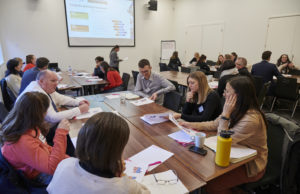Teachers’ perspectives on financial education in the UK
According to a recent YouGov survey of over 1,000 teachers commissioned by Young Enterprise, against a difficult backdrop of tight budgets and time pressures, many teachers across the UK are delivering financial education across different phases and subjects, but provision is inconsistent leaving some young people missing out.
Headlines include:
- 67% of secondary teachers say that financial education is being delivered at their schools
- 40% of secondary maths teachers are including some elements of financial education in their lessons
- 87% of teachers think it is important that financial education resources are independently quality assured
Two-thirds of secondary schools are delivering financial education
- Two-thirds (67%) of secondary teachers report that financial education is being delivered at their school, 21% report it is not, and 12% don’t know.[1]
- For primary schools, just over two-fifths (42%) of primary teachers report that financial education is being delivered at their school, whereas half (50%) report it is not and 7% are unsure.
- For all phases of education combined, 72% of teachers in Scotland report that financial education is being delivered at their school and 51% of teachers in England (sample size too small to report figures for Wales and Northern Ireland).
Two-in-five maths teachers deliver elements of financial education
- Two-fifths (40%) of secondary maths teachers are involved with delivering some elements of financial education in their lessons.
- Across all subjects and phases, one-quarter (25%) of teachers are involved with delivering some element of financial education, and this does not differ much between secondary teachers (26%) and primary teachers (25%).
Teachers want access to independently quality assured financial education resources
- The vast majority of teachers (87%) think it is important that financial education resources being used in schools should pass through an independent quality assurance process.
- For teachers of maths, PSHE and Citizenship specifically, a similarly high proportion (83%) think it is important that financial education resources used in schools should pass through an independent quality assurance process.
- When asked who should operate an independent quality assurance process, over one-in-five (21% of respondents) would prefer it to be a national education charity, followed by an awarding body (14%), and then a government body (13%).
- This order of preference is the same for both primary and secondary teachers.
This research was commissioned to support the continued development of the Young Enterprise Financial Education Quality Mark which is currently funded by the Money and Pensions Service (MaPS).
All figures, unless otherwise stated, are from YouGov Plc. Total sample size was 1,009 adults. Fieldwork was undertaken between 9th – 19th February 2024. The survey was carried out online. The figures have been weighted and are representative of all UK teachers (aged 18+).
About Young Enterprise
Young Enterprise is a leading employability and financial education charity empowering young people across the UK. Every year, we support over 400,000 young people with our range of programmes designed to equip young people with the skills, knowledge and confidence they need to succeed.
Our longstanding ‘My Money Week’ activities programme is taking place this year between 10th and 14th June, supporting educators with resources and ideas to get children and young people aged between 3 and 19 excited and interested in financial matters.
Young Enterprise acts as the Secretariat for the All-Party Parliamentary Group on Financial Education for Young People which has been active since 2011 and is one of the largest groups of its kind.
[1] Since 2014, financial education has been in the secondary curriculum across all parts of the UK

Back to other news
